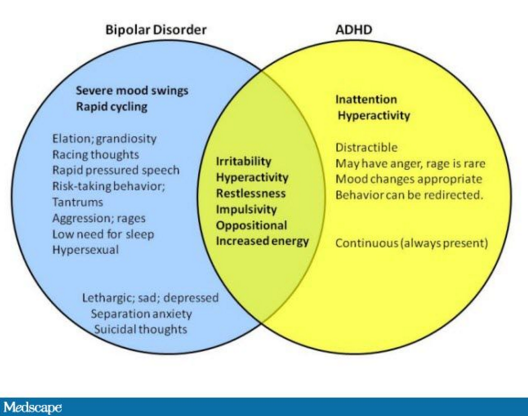Have you noticed that your child has very intense moods?Do you have extreme behavioral changes?Do you have very sad moments and suddenly show yoursed with enthusiasm and exaggerated joy?If this type of behavior occurs consistently and is part of the daily routine, it may be time to learn more about bipolar disorder in children.
Not all sudden and intense mood swings in children mean this disorder exists, and this can only be confirmed by a mental health specialist after proper evaluation.
- Although most cases are diagnosed in older children and adolescents.
- This can occur at any age.
- Let’s see this.
Bipolar disorder affects children’s mood and energy, causing sudden changes in their emotions.
Sometimes they feel very happy, too happy and do not stop, they keep circulating, it is a period of unusual exaltation. This condition is known as mania, at other times they feel very sad, they feel an discomfort that influences their activity and their energy level, so-called depression.
Do children with bipolar disorder experience unusual mood swings?
Unlike bipolar disorder in adults, children experience manic and depressive symptoms on the same day or may appear simultaneously, so bipolar disorder in children may be more severe at this stage than in adolescence or adulthood.
However, it is important to note that bipolar disorder is not the same as the normal ups and downs of behavior and mood that can happen to any child, in fact, children with bipolar disorder have difficulty doing their homework and socializing with their co-workers and their families.
The essential feature of a manic episode is a period defined by an abnormal and constantly elevated, expansive and irritable sense of humor; it is also characterized by an abnormal or persistent increase in activity or energy.
The sense of humor in a manic episode is often described as euphoric, too cheerful, or with the feeling of being above all.
In children, joy and nonsense are normal in the context of special circumstances, if these symptoms are recurrent and inappropriate in the context or exceed what is expected for the child’s level of development, we should pay attention to them.
During the manic episode, the child can participate in many new and sneaky games, even sometimes in unwelcome moments. In addition, it has a high self-esteem ranging from criticism for lack of self-confidence to a high height that can reach delusional dimensions.
Children usually overestimate their abilities and are sure, for example, to be the best in a particular sport or the smartest in the class.
The belief that these children have their own greatness is still there despite clear evidence to the contrary. In addition, the child can perform clearly dangerous feats.
One of the most common features of mania is the decrease in the need for sleep, unlike insomnia. In case of insomnia, the person wants to sleep or feels the need to sleep, but cannot. Already in an episode of mania, the person gets little sleep and wakes up several hours before normal time, feeling rested and full of energy.
The slightest need for sleep is often a sign of a manic episode
Depression refers to a set of related symptoms that appear and disappear together, this set is usually composed of sadness, irritability, loss of interest, fatigue, feelings of inferiority and guilt, psychomotor slowness, insomnia, suicidal ideas, lack of appetite, weight loss and difficulty concentrating.
It is important to remember that children often feel sad, discouraged, irritable, tired, or guilty, it is necessary to differentiate the joint appearance of these normal behaviors from the presence of depressive syndrome.
“Children often feel sad, discouraged, irritable, tired, or guilty. “
Thus, for example, it is necessary to differentiate a normal state of demotion and complaints of discomfort when performing certain activities, from the depressive symptom of persistent and widespread disinterest in all kinds of activities.
It is also necessary to differentiate the reluctance to eat and the tendency to delay feeding from the severe loss of appetite which is a symptom of depression. It is necessary to differentiate typical fatigue from long school and extracurricular hours from continuous depressive fatigue.
Children who experience a manic episode may feel too happy; they can suddenly express their bad mood; Talking quickly about many different topics You have difficulty staying asleep, but feeling rested You have concentration problems Behave dangerously, etc.
Children who experience a depressive episode may feel very sad. They may also have somatic disorders, such as headaches or stomach pains; sleep too much or too little, feel inferior to others, or feel guilty.
They may also have little energy and not be interested in fun games until they think about death or suicide.
As with many other disorders and diseases, there is no single cause for the cause of bipolar disorder in children; there are many factors that can lead to this.
Genetics plays a very important role in the development of bipolar disorder in children because it is hereditary; for example, children with a history of bipolarity in the family are more likely to develop the disorder.
On the other hand, there is also a hypothesis that there is a form of anomaly in the structure or function of the brain. Interesting evidence for reflection is that bipolar disorder is more common in rich countries than in poor countries.
“There are several factors that can cause a child to develop bipolar disorder. “
If your child has bipolar disorder, keep in mind that treatment is similar to that used in adults. Treatment can help control symptoms and works best when continuous and uninterrupted. Medications are often helpful in stabilizing mood.
With proper treatment, children with this disorder should improve over time. However, it is often normal to try several times before finding the perfect treatment for each person.
Bibliography:

